Watched October 29 - November 4, 2007: Korea in 1990 -- and now
Keduldo urichurum / The Black Republic (PARK Kwang-su, 1990)
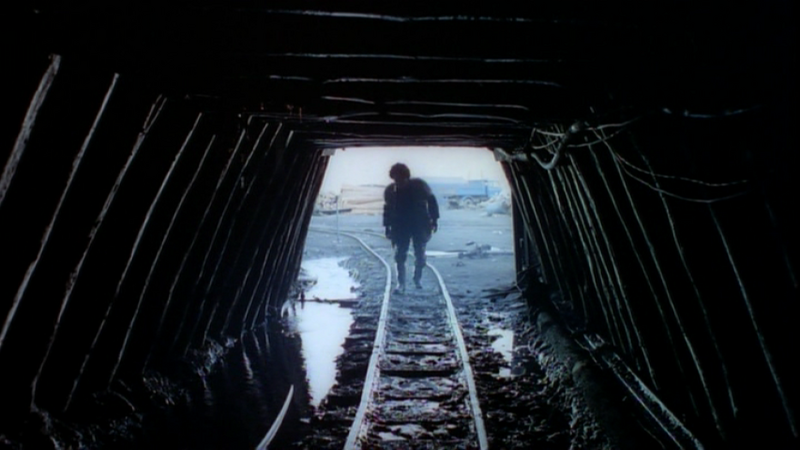 Park was one of the founding fathers of Korea's "New Cinema" of the 1990s. While his first film, Chilsu and Mansu, touched on political matters, Black Republic was his first film to openly confront the turmoil (and devastation) of the political oppression and violence of the 1970s and 1980s (especially in the wake of the Gwangju Massacre in 1980).
Park was one of the founding fathers of Korea's "New Cinema" of the 1990s. While his first film, Chilsu and Mansu, touched on political matters, Black Republic was his first film to openly confront the turmoil (and devastation) of the political oppression and violence of the 1970s and 1980s (especially in the wake of the Gwangju Massacre in 1980).  Censors did insist on removal of most of the flashbacks that actively linked the protagonist's present with his past and filled in the gap between 1980 and 1990. But the implicit links that remain are fairly clear, even for someone as inexpert in Korean history as myself.
Censors did insist on removal of most of the flashbacks that actively linked the protagonist's present with his past and filled in the gap between 1980 and 1990. But the implicit links that remain are fairly clear, even for someone as inexpert in Korean history as myself.
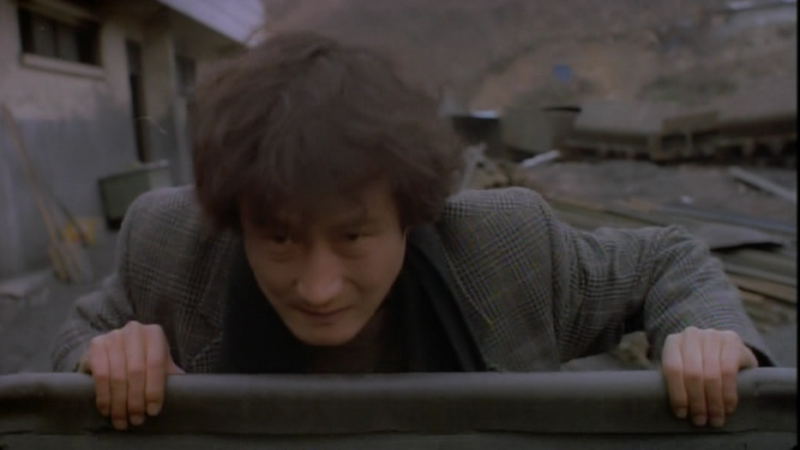 The story here centers on a political activist (played by MOON Sung-keun), who has flitted from place to place, remaining "in hiding" for a decade following the Gwangju Massacre. By using a series of false names and identification papers, and restricting himself to life in small provincial towns,
The story here centers on a political activist (played by MOON Sung-keun), who has flitted from place to place, remaining "in hiding" for a decade following the Gwangju Massacre. By using a series of false names and identification papers, and restricting himself to life in small provincial towns, 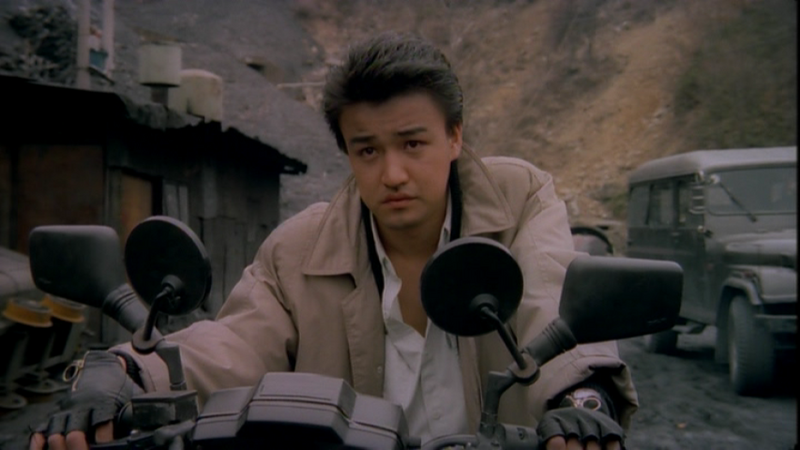 he has managed to not get arrested on long-pending charges of revolutionary activity. At the start of the film, he arrives at a small, dingy mining town -- and finds a job. Unfortunately, the mine workers here are on the verge of a strike -- and the mine owner's irresponsible and brutal son (PARK Joon-hoon) causes lots of random chaos in the vicinity.
he has managed to not get arrested on long-pending charges of revolutionary activity. At the start of the film, he arrives at a small, dingy mining town -- and finds a job. Unfortunately, the mine workers here are on the verge of a strike -- and the mine owner's irresponsible and brutal son (PARK Joon-hoon) causes lots of random chaos in the vicinity.
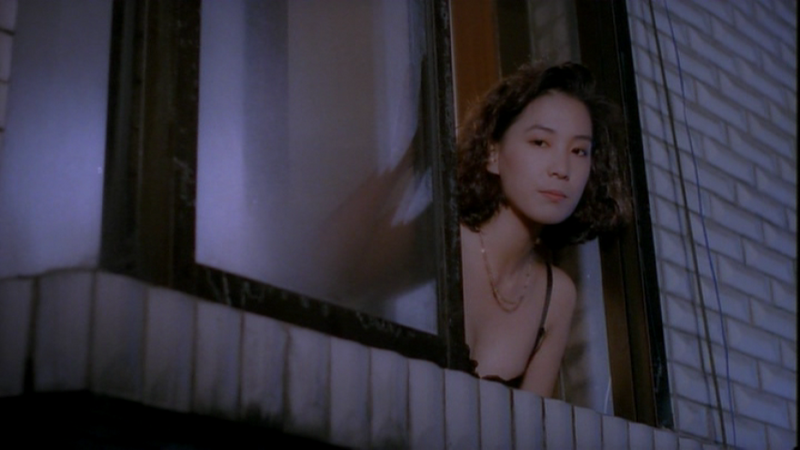 Despite the town's small size, it is not too small to support a prostitution business (in which women are nominally employed to deliver thermoses of tea and coffee). One of the young prostitutes (SHIM Hye-jin) especially favored by Park is attracted to the new, stand-offish but considerate Moon.
Despite the town's small size, it is not too small to support a prostitution business (in which women are nominally employed to deliver thermoses of tea and coffee). One of the young prostitutes (SHIM Hye-jin) especially favored by Park is attracted to the new, stand-offish but considerate Moon. 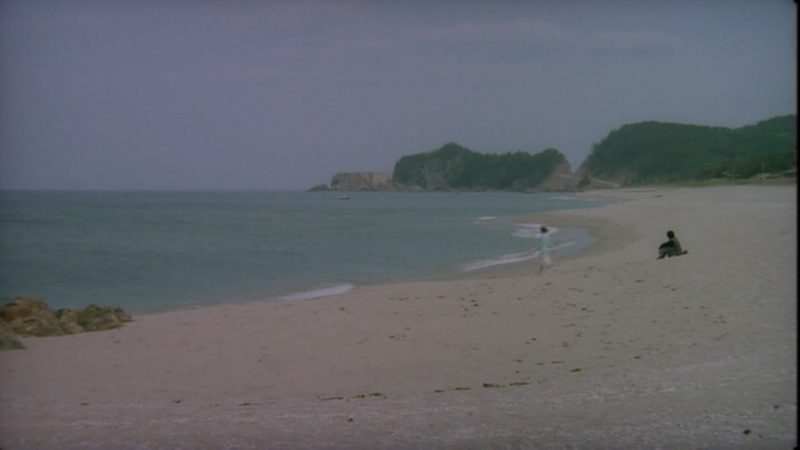 As the labor situation worsens, the couple are drawn closer together -- and eventually spend a day at a seaside town (in an inexpensive but pleasing idyll). Shim's attachment to Moon makes her reluctant to continue to "deliver tea", leading to a confrontation with Park. When Moon fights Park to stop his assault on Shim, he is arrested (and roughed up by the police).
As the labor situation worsens, the couple are drawn closer together -- and eventually spend a day at a seaside town (in an inexpensive but pleasing idyll). Shim's attachment to Moon makes her reluctant to continue to "deliver tea", leading to a confrontation with Park. When Moon fights Park to stop his assault on Shim, he is arrested (and roughed up by the police). 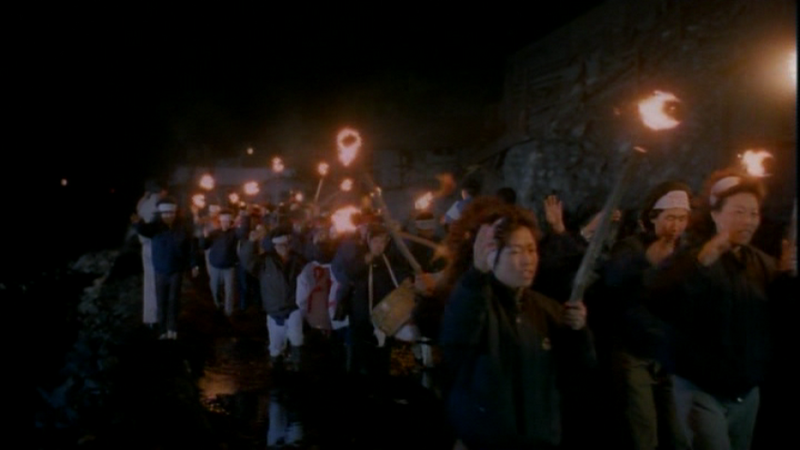 Moon's false identification papers stand up temporarily, but he is fingerprinted before being released (as a formality). Moon knows he needs to go on the move again -- and Shim hopes to join him. But Park (more dangerous than ever, due to the death of his mother, who had been dumped years before by his father) once again causes complications -- and Moon has to leave on his own.
Moon's false identification papers stand up temporarily, but he is fingerprinted before being released (as a formality). Moon knows he needs to go on the move again -- and Shim hopes to join him. But Park (more dangerous than ever, due to the death of his mother, who had been dumped years before by his father) once again causes complications -- and Moon has to leave on his own.
The performances of Moon and Shim are quite effective.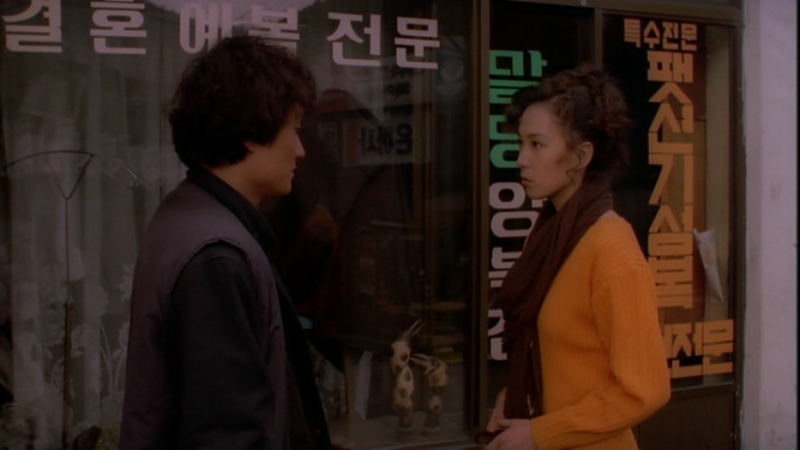 Their finest scene, perhaps, is their leave-taking after their one day of shared happiness. During that day, Moon has told Shim of his past (and entrusted her with his real name). After they part, Shim calls on Moon to stop and wait; at a distance, mostly hidden in shadow, she tells him her real name (presumably she adopted a false name due to her shame at the job she has been "forced" to take, for lack of other opportunities).
Their finest scene, perhaps, is their leave-taking after their one day of shared happiness. During that day, Moon has told Shim of his past (and entrusted her with his real name). After they part, Shim calls on Moon to stop and wait; at a distance, mostly hidden in shadow, she tells him her real name (presumably she adopted a false name due to her shame at the job she has been "forced" to take, for lack of other opportunities).
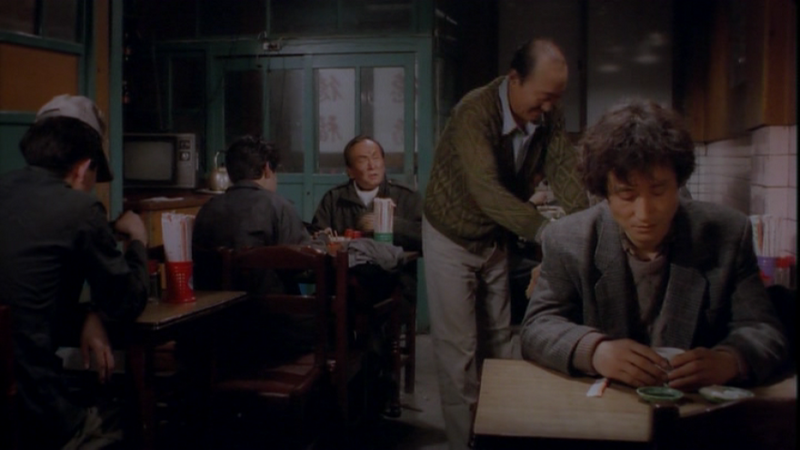 The film is visually well-imagined, but the (subbed) Korean DVD is probably not an optimal representation of the film, as it initially looked like. This film deserves a better presentation (fully restored) to be sure, but we are lucky to have any version available of this important and impressive film.
The film is visually well-imagined, but the (subbed) Korean DVD is probably not an optimal representation of the film, as it initially looked like. This film deserves a better presentation (fully restored) to be sure, but we are lucky to have any version available of this important and impressive film.
Janghwa, Hongryeon / A Tale of Two Sisters (KIM Ji-woon, 2003)
 Kim's film is one of those films that one really is constrained in discussing. First, one does not really wish to say too much about what goes on, for fear of spoiling the film for others who have not yet seen it.
Kim's film is one of those films that one really is constrained in discussing. First, one does not really wish to say too much about what goes on, for fear of spoiling the film for others who have not yet seen it. 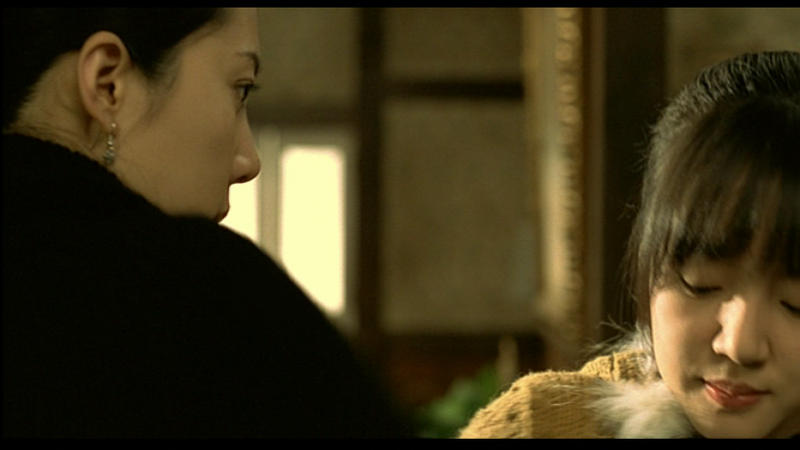 Second, the film's nature is such that one is not actually sure as to what is real and what is not. The film is superficially patterned on a Korean folk tale (not too dissimilar from the Grimm's The Juniper Tree) about two young sisters and a step-mother who mistreats them quite cruelly.
Second, the film's nature is such that one is not actually sure as to what is real and what is not. The film is superficially patterned on a Korean folk tale (not too dissimilar from the Grimm's The Juniper Tree) about two young sisters and a step-mother who mistreats them quite cruelly. 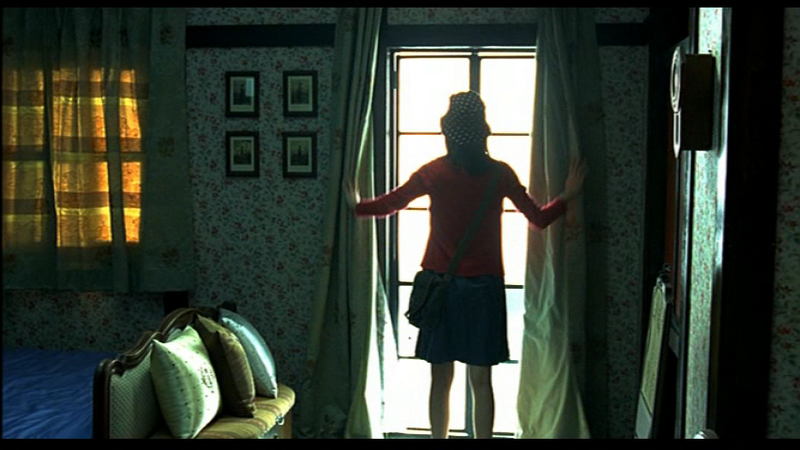 This folk tale is well known-- and has served as the basis for several earlier films. Paradoxically (or perhaps not), the familiarity of the tale allows Kim greater scope to challenge expectations. Even for someone not inured in Korean folklore, one senses the declining reliability of the narrative as the film proceeds.
This folk tale is well known-- and has served as the basis for several earlier films. Paradoxically (or perhaps not), the familiarity of the tale allows Kim greater scope to challenge expectations. Even for someone not inured in Korean folklore, one senses the declining reliability of the narrative as the film proceeds. 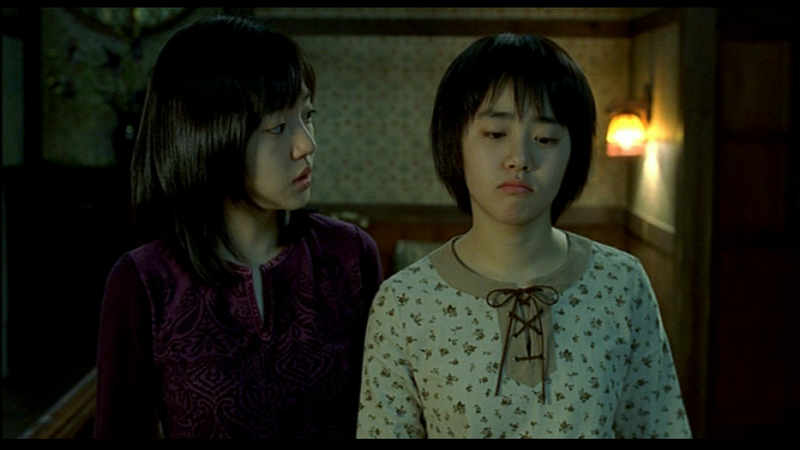 Indeed, this might be the most virtuosic use of unreliable narration in an Asian film since Kinugasa's Kurutta ippeji (Pages of Madness / Pages Out of Order) back in 1926. This film is more akin, I suspect, to Henry James' Turn of the Screw than to the folk tale that gives it its name.
Indeed, this might be the most virtuosic use of unreliable narration in an Asian film since Kinugasa's Kurutta ippeji (Pages of Madness / Pages Out of Order) back in 1926. This film is more akin, I suspect, to Henry James' Turn of the Screw than to the folk tale that gives it its name.
The performances in this are quite good, the cinematography is excellent, the script is outstanding.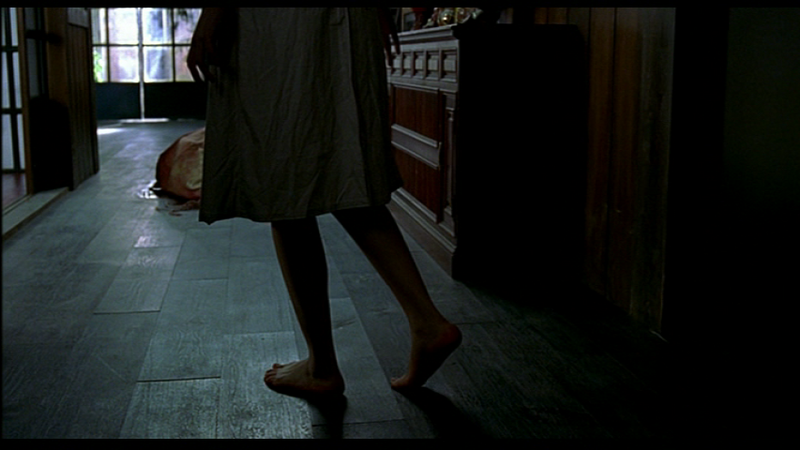 It is a film that demands both watching and, afterwards, discussion -- both as to the overall "meaning" and the significance of every little detail. These have occurred in our household of five -- and online. And, in both venues, voices have been raised and tempers have flared (at least a bit).
It is a film that demands both watching and, afterwards, discussion -- both as to the overall "meaning" and the significance of every little detail. These have occurred in our household of five -- and online. And, in both venues, voices have been raised and tempers have flared (at least a bit). 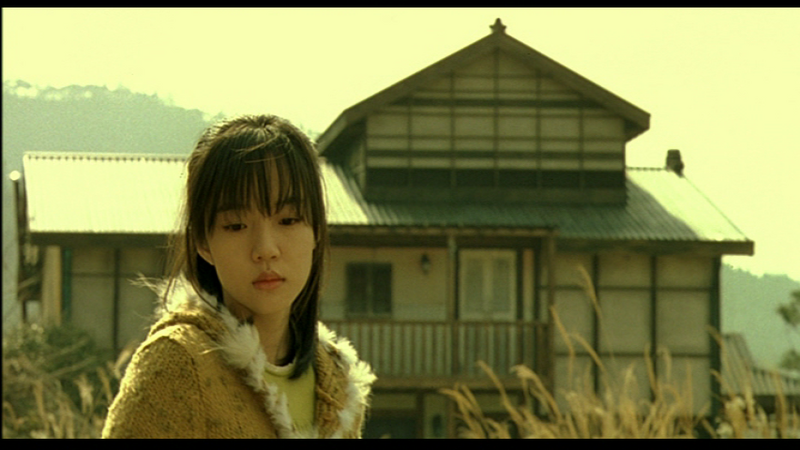 While I suppose one might be able to savor this film's virtues in solitude, it surely benefits, more than most, from attentive communal watching. While live discussions with fellow watchers are unproblematic, online discussions are best handled in threads that warn prominently -- SPOILERS.
While I suppose one might be able to savor this film's virtues in solitude, it surely benefits, more than most, from attentive communal watching. While live discussions with fellow watchers are unproblematic, online discussions are best handled in threads that warn prominently -- SPOILERS.
Dalkom, salbeorhan yeonin / My Scary Girl (SON Jae-gon, 2006)
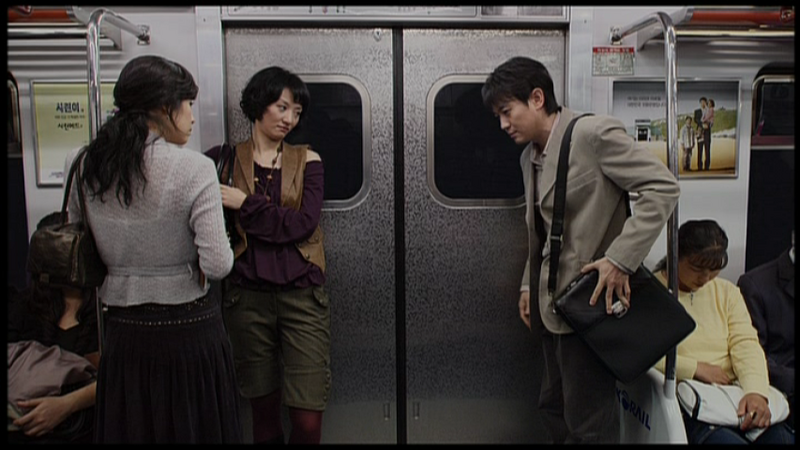 The actual translation of this film's Korean name is something like "sweet, brutal lover" -- which gives one a better sense of the film than the cute English title. This is structured rather like a romantic comedy. But it is a romantic comedy with a remarkable number of unsettling twists.
The actual translation of this film's Korean name is something like "sweet, brutal lover" -- which gives one a better sense of the film than the cute English title. This is structured rather like a romantic comedy. But it is a romantic comedy with a remarkable number of unsettling twists. 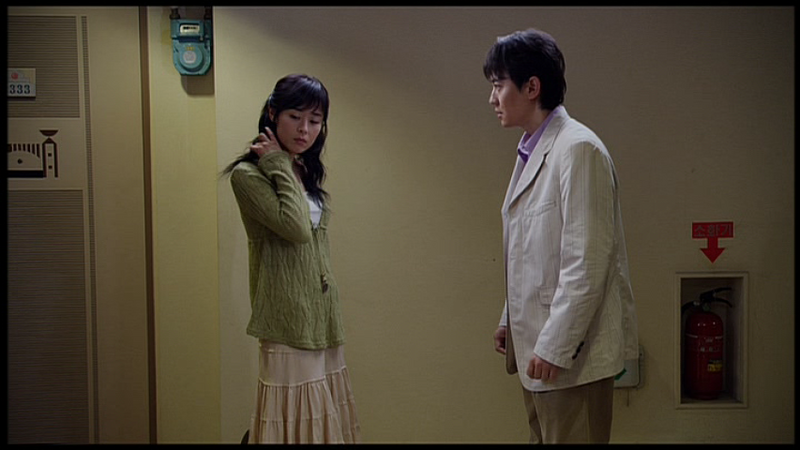 As Darcy Paquet said in his review, it is "like a romantic comedy left out on the counter that starts to turn black". Despite its unconventionality, this low-budget (under $800,000) film, shot with HD video, was a big success theatrically in Korea.
As Darcy Paquet said in his review, it is "like a romantic comedy left out on the counter that starts to turn black". Despite its unconventionality, this low-budget (under $800,000) film, shot with HD video, was a big success theatrically in Korea.
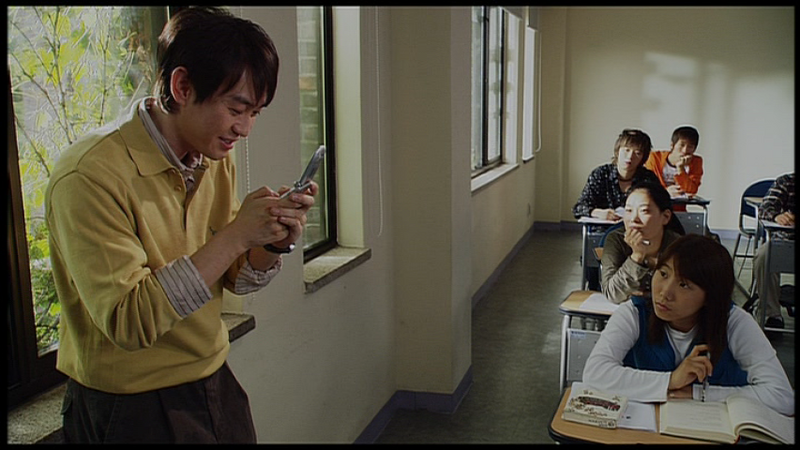 A shy college teacher (played by Park Yong-woo), who is not only a perennial bachelor but has never even dated, gets a new neighbor, a sweet-seeming art student (Choi Gang-hee).
A shy college teacher (played by Park Yong-woo), who is not only a perennial bachelor but has never even dated, gets a new neighbor, a sweet-seeming art student (Choi Gang-hee). 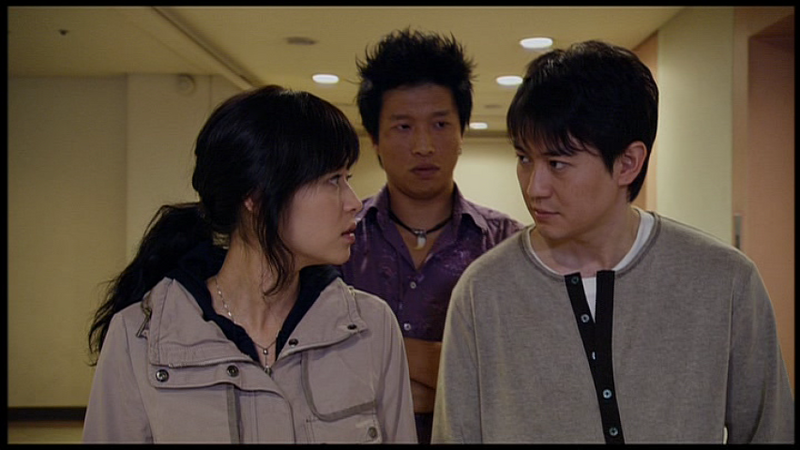 Things get off to a somewhat rocky start, but Park and Choi eventually take an interest in each other. Among other things, Park is introduced to not only elementary kissing, but also the advanced level. But there ae some negatives --
Things get off to a somewhat rocky start, but Park and Choi eventually take an interest in each other. Among other things, Park is introduced to not only elementary kissing, but also the advanced level. But there ae some negatives -- 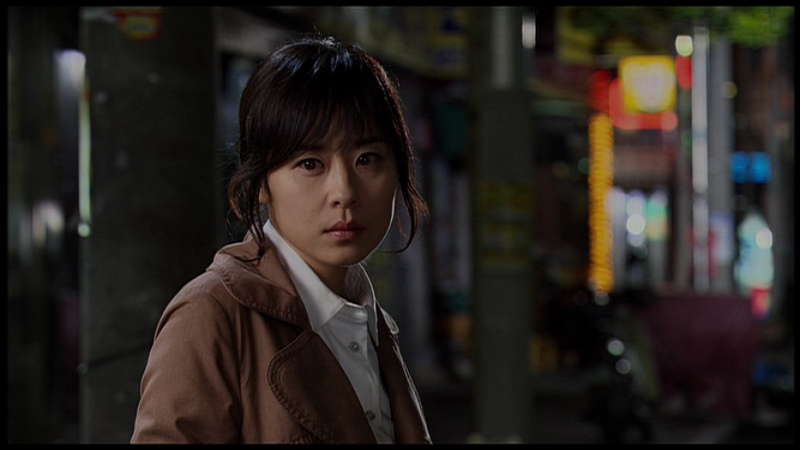 Choi has some rather strange friends and acquaintances, and shows some puzzling behaviors (like her lack of knowledge of basic art facts that even English teachers know). And then there are hints of secrets that Park knows nothing about.
Choi has some rather strange friends and acquaintances, and shows some puzzling behaviors (like her lack of knowledge of basic art facts that even English teachers know). And then there are hints of secrets that Park knows nothing about. 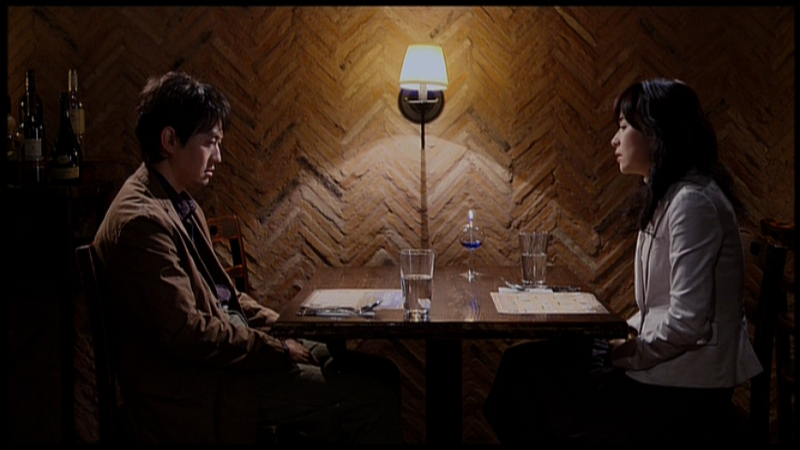 He gets so worried, he even hires a private investigator to do a little (relatively inexpensive) background research. But still Park is drawn like a moth to a flame (or is it more like a fly getting dangerously close to a spider web). The ending -- like the rest of the film -- is original.
He gets so worried, he even hires a private investigator to do a little (relatively inexpensive) background research. But still Park is drawn like a moth to a flame (or is it more like a fly getting dangerously close to a spider web). The ending -- like the rest of the film -- is original.
The script here is quite good, with that is outrageous in an unconventional fashion -- and usually truly funny.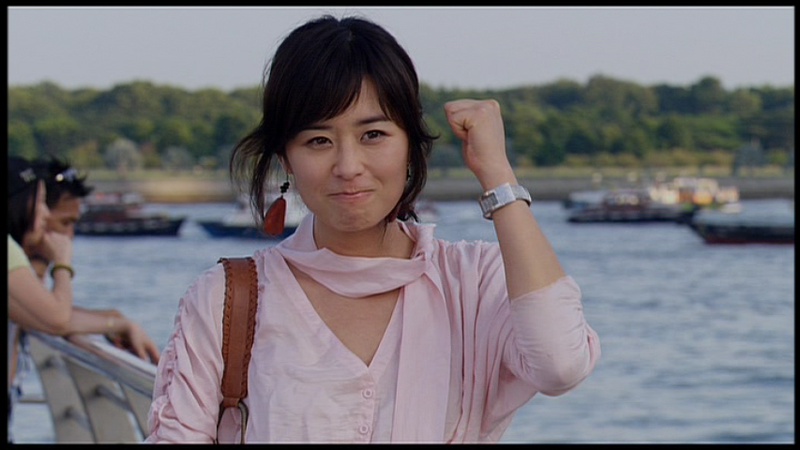 The two leads are excellent -- and so are the major supporting performers. The (digital) cinematography is not especially distinctive stylistically, but is attractive and effective -- and looks surprisingly film-like. I got the HK DVD as a freebie with a recent online order -- and it is quite adequate. Perhaps the Korean DVD is even better.
The two leads are excellent -- and so are the major supporting performers. The (digital) cinematography is not especially distinctive stylistically, but is attractive and effective -- and looks surprisingly film-like. I got the HK DVD as a freebie with a recent online order -- and it is quite adequate. Perhaps the Korean DVD is even better.
 Park was one of the founding fathers of Korea's "New Cinema" of the 1990s. While his first film, Chilsu and Mansu, touched on political matters, Black Republic was his first film to openly confront the turmoil (and devastation) of the political oppression and violence of the 1970s and 1980s (especially in the wake of the Gwangju Massacre in 1980).
Park was one of the founding fathers of Korea's "New Cinema" of the 1990s. While his first film, Chilsu and Mansu, touched on political matters, Black Republic was his first film to openly confront the turmoil (and devastation) of the political oppression and violence of the 1970s and 1980s (especially in the wake of the Gwangju Massacre in 1980).  Censors did insist on removal of most of the flashbacks that actively linked the protagonist's present with his past and filled in the gap between 1980 and 1990. But the implicit links that remain are fairly clear, even for someone as inexpert in Korean history as myself.
Censors did insist on removal of most of the flashbacks that actively linked the protagonist's present with his past and filled in the gap between 1980 and 1990. But the implicit links that remain are fairly clear, even for someone as inexpert in Korean history as myself. The story here centers on a political activist (played by MOON Sung-keun), who has flitted from place to place, remaining "in hiding" for a decade following the Gwangju Massacre. By using a series of false names and identification papers, and restricting himself to life in small provincial towns,
The story here centers on a political activist (played by MOON Sung-keun), who has flitted from place to place, remaining "in hiding" for a decade following the Gwangju Massacre. By using a series of false names and identification papers, and restricting himself to life in small provincial towns,  he has managed to not get arrested on long-pending charges of revolutionary activity. At the start of the film, he arrives at a small, dingy mining town -- and finds a job. Unfortunately, the mine workers here are on the verge of a strike -- and the mine owner's irresponsible and brutal son (PARK Joon-hoon) causes lots of random chaos in the vicinity.
he has managed to not get arrested on long-pending charges of revolutionary activity. At the start of the film, he arrives at a small, dingy mining town -- and finds a job. Unfortunately, the mine workers here are on the verge of a strike -- and the mine owner's irresponsible and brutal son (PARK Joon-hoon) causes lots of random chaos in the vicinity. Despite the town's small size, it is not too small to support a prostitution business (in which women are nominally employed to deliver thermoses of tea and coffee). One of the young prostitutes (SHIM Hye-jin) especially favored by Park is attracted to the new, stand-offish but considerate Moon.
Despite the town's small size, it is not too small to support a prostitution business (in which women are nominally employed to deliver thermoses of tea and coffee). One of the young prostitutes (SHIM Hye-jin) especially favored by Park is attracted to the new, stand-offish but considerate Moon.  As the labor situation worsens, the couple are drawn closer together -- and eventually spend a day at a seaside town (in an inexpensive but pleasing idyll). Shim's attachment to Moon makes her reluctant to continue to "deliver tea", leading to a confrontation with Park. When Moon fights Park to stop his assault on Shim, he is arrested (and roughed up by the police).
As the labor situation worsens, the couple are drawn closer together -- and eventually spend a day at a seaside town (in an inexpensive but pleasing idyll). Shim's attachment to Moon makes her reluctant to continue to "deliver tea", leading to a confrontation with Park. When Moon fights Park to stop his assault on Shim, he is arrested (and roughed up by the police).  Moon's false identification papers stand up temporarily, but he is fingerprinted before being released (as a formality). Moon knows he needs to go on the move again -- and Shim hopes to join him. But Park (more dangerous than ever, due to the death of his mother, who had been dumped years before by his father) once again causes complications -- and Moon has to leave on his own.
Moon's false identification papers stand up temporarily, but he is fingerprinted before being released (as a formality). Moon knows he needs to go on the move again -- and Shim hopes to join him. But Park (more dangerous than ever, due to the death of his mother, who had been dumped years before by his father) once again causes complications -- and Moon has to leave on his own.The performances of Moon and Shim are quite effective.
 Their finest scene, perhaps, is their leave-taking after their one day of shared happiness. During that day, Moon has told Shim of his past (and entrusted her with his real name). After they part, Shim calls on Moon to stop and wait; at a distance, mostly hidden in shadow, she tells him her real name (presumably she adopted a false name due to her shame at the job she has been "forced" to take, for lack of other opportunities).
Their finest scene, perhaps, is their leave-taking after their one day of shared happiness. During that day, Moon has told Shim of his past (and entrusted her with his real name). After they part, Shim calls on Moon to stop and wait; at a distance, mostly hidden in shadow, she tells him her real name (presumably she adopted a false name due to her shame at the job she has been "forced" to take, for lack of other opportunities). The film is visually well-imagined, but the (subbed) Korean DVD is probably not an optimal representation of the film, as it initially looked like. This film deserves a better presentation (fully restored) to be sure, but we are lucky to have any version available of this important and impressive film.
The film is visually well-imagined, but the (subbed) Korean DVD is probably not an optimal representation of the film, as it initially looked like. This film deserves a better presentation (fully restored) to be sure, but we are lucky to have any version available of this important and impressive film.Janghwa, Hongryeon / A Tale of Two Sisters (KIM Ji-woon, 2003)
 Kim's film is one of those films that one really is constrained in discussing. First, one does not really wish to say too much about what goes on, for fear of spoiling the film for others who have not yet seen it.
Kim's film is one of those films that one really is constrained in discussing. First, one does not really wish to say too much about what goes on, for fear of spoiling the film for others who have not yet seen it.  Second, the film's nature is such that one is not actually sure as to what is real and what is not. The film is superficially patterned on a Korean folk tale (not too dissimilar from the Grimm's The Juniper Tree) about two young sisters and a step-mother who mistreats them quite cruelly.
Second, the film's nature is such that one is not actually sure as to what is real and what is not. The film is superficially patterned on a Korean folk tale (not too dissimilar from the Grimm's The Juniper Tree) about two young sisters and a step-mother who mistreats them quite cruelly.  This folk tale is well known-- and has served as the basis for several earlier films. Paradoxically (or perhaps not), the familiarity of the tale allows Kim greater scope to challenge expectations. Even for someone not inured in Korean folklore, one senses the declining reliability of the narrative as the film proceeds.
This folk tale is well known-- and has served as the basis for several earlier films. Paradoxically (or perhaps not), the familiarity of the tale allows Kim greater scope to challenge expectations. Even for someone not inured in Korean folklore, one senses the declining reliability of the narrative as the film proceeds.  Indeed, this might be the most virtuosic use of unreliable narration in an Asian film since Kinugasa's Kurutta ippeji (Pages of Madness / Pages Out of Order) back in 1926. This film is more akin, I suspect, to Henry James' Turn of the Screw than to the folk tale that gives it its name.
Indeed, this might be the most virtuosic use of unreliable narration in an Asian film since Kinugasa's Kurutta ippeji (Pages of Madness / Pages Out of Order) back in 1926. This film is more akin, I suspect, to Henry James' Turn of the Screw than to the folk tale that gives it its name.The performances in this are quite good, the cinematography is excellent, the script is outstanding.
 It is a film that demands both watching and, afterwards, discussion -- both as to the overall "meaning" and the significance of every little detail. These have occurred in our household of five -- and online. And, in both venues, voices have been raised and tempers have flared (at least a bit).
It is a film that demands both watching and, afterwards, discussion -- both as to the overall "meaning" and the significance of every little detail. These have occurred in our household of five -- and online. And, in both venues, voices have been raised and tempers have flared (at least a bit).  While I suppose one might be able to savor this film's virtues in solitude, it surely benefits, more than most, from attentive communal watching. While live discussions with fellow watchers are unproblematic, online discussions are best handled in threads that warn prominently -- SPOILERS.
While I suppose one might be able to savor this film's virtues in solitude, it surely benefits, more than most, from attentive communal watching. While live discussions with fellow watchers are unproblematic, online discussions are best handled in threads that warn prominently -- SPOILERS.Dalkom, salbeorhan yeonin / My Scary Girl (SON Jae-gon, 2006)
 The actual translation of this film's Korean name is something like "sweet, brutal lover" -- which gives one a better sense of the film than the cute English title. This is structured rather like a romantic comedy. But it is a romantic comedy with a remarkable number of unsettling twists.
The actual translation of this film's Korean name is something like "sweet, brutal lover" -- which gives one a better sense of the film than the cute English title. This is structured rather like a romantic comedy. But it is a romantic comedy with a remarkable number of unsettling twists.  As Darcy Paquet said in his review, it is "like a romantic comedy left out on the counter that starts to turn black". Despite its unconventionality, this low-budget (under $800,000) film, shot with HD video, was a big success theatrically in Korea.
As Darcy Paquet said in his review, it is "like a romantic comedy left out on the counter that starts to turn black". Despite its unconventionality, this low-budget (under $800,000) film, shot with HD video, was a big success theatrically in Korea. A shy college teacher (played by Park Yong-woo), who is not only a perennial bachelor but has never even dated, gets a new neighbor, a sweet-seeming art student (Choi Gang-hee).
A shy college teacher (played by Park Yong-woo), who is not only a perennial bachelor but has never even dated, gets a new neighbor, a sweet-seeming art student (Choi Gang-hee).  Things get off to a somewhat rocky start, but Park and Choi eventually take an interest in each other. Among other things, Park is introduced to not only elementary kissing, but also the advanced level. But there ae some negatives --
Things get off to a somewhat rocky start, but Park and Choi eventually take an interest in each other. Among other things, Park is introduced to not only elementary kissing, but also the advanced level. But there ae some negatives --  Choi has some rather strange friends and acquaintances, and shows some puzzling behaviors (like her lack of knowledge of basic art facts that even English teachers know). And then there are hints of secrets that Park knows nothing about.
Choi has some rather strange friends and acquaintances, and shows some puzzling behaviors (like her lack of knowledge of basic art facts that even English teachers know). And then there are hints of secrets that Park knows nothing about.  He gets so worried, he even hires a private investigator to do a little (relatively inexpensive) background research. But still Park is drawn like a moth to a flame (or is it more like a fly getting dangerously close to a spider web). The ending -- like the rest of the film -- is original.
He gets so worried, he even hires a private investigator to do a little (relatively inexpensive) background research. But still Park is drawn like a moth to a flame (or is it more like a fly getting dangerously close to a spider web). The ending -- like the rest of the film -- is original.The script here is quite good, with that is outrageous in an unconventional fashion -- and usually truly funny.
 The two leads are excellent -- and so are the major supporting performers. The (digital) cinematography is not especially distinctive stylistically, but is attractive and effective -- and looks surprisingly film-like. I got the HK DVD as a freebie with a recent online order -- and it is quite adequate. Perhaps the Korean DVD is even better.
The two leads are excellent -- and so are the major supporting performers. The (digital) cinematography is not especially distinctive stylistically, but is attractive and effective -- and looks surprisingly film-like. I got the HK DVD as a freebie with a recent online order -- and it is quite adequate. Perhaps the Korean DVD is even better.
Comments